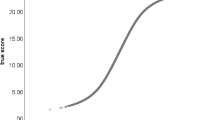Abstract
Regularity theories of causation assert that causal or nomic notions are to be reduced into “mere” frequencies of particular, non-nomic, co-located qualities and matters of fact. In this essay, I present a critical exploration of Armstrong (1983) and Strawson’s (1989) explanatory arguments against regularity theories. The shortcomings of these older arguments for nomic realism are identified and a revamped version which is immune to such problems is outlined and defended. I argue that anti-realism suffers substantial disconfirmation due to its comparative inability to unify empirical regularities in the absence of any probabilistic counterweights. I also show that realist theories are much more probable than their anti-realist competitors both individually and in aggregate. This is shown to be the case with even the most humble of observational data. This revamped argument is Bayesian in character; it is immune to the criticisms of Beebee (2006), Everitt (1991), Loewer (1996), and van Fraassen (1985); and it is empiricist friendly to boot.
Similar content being viewed by others
Notes
Though the term “prescriptive” is typically used in moral discourse, I follow Beebee (2000) in her use of terms.
Though, see Hall’s (2015, pp. 263–264) combinatorial reformulation due to worries about triviality.
I have removed the ubiquitous background knowledge term from my symbolisms for ease of exposition only.
The anti-realist is free to fill in the metaphysical details regarding just what these entities are supposed to be. It is irrelevant for the sake of the argument so long as said details remain within metaphysically descriptive parameters.
Obvious restrictions apply. I assume that one is not epistemically certain about the status of each point-instant such that P(\(P_{k}) < 1\), and likewise with Strawson’s analogy that P(\(X_{k}) < 1\).
Beebee’s initial use of this argument (2006, pp. 525–526) specifically targets Strawson’s broader causal theory and the philosophical commitments that accompany it. But, the criticism’s kernel may be generalized.
See especially Robin Collins (1994) for a convincing case against the notion that truth is a prerequisite for yielding genuine explanations or predictions.
See Mackie (1985, pp. 159–177) for a persuasive rebuttal to Hume’s assumption that the probability relation must be constructed out of causal building blocks.
That ad hocness can be clearly modeled in Bayesian terms is another feather in the a priorist’s cap.
Modulo that our reasoner is not epistemically certain of either term such that \(\hbox {P}_{tk}(\sim H_{k}) < 1\), and that \(\hbox {P}_{tk}(A_{k}) < 1\).
Special thanks to Marc Alspector-Kelly for raising this objection.
References
Alspector-Kelly, M. (2004). Seeing the unobservable: Van Fraassen and the limits of experience. Synthese, 140, 331–353.
Armstrong, D. (1983). What is a law of nature?. Cambridge: Cambridge University Press.
Beebee, H. (2000). The non-governing conception of laws of nature. Philosophy and Phenomenological Research, 61, 571–594.
Beebee, H. (2006). Does anything hold the universe together? Synthese, 149, 509–533.
Carroll, J. (1994). Laws of nature. Cambridge: Cambridge University Press.
Collins, R. (1994). Against the epistemic value of prediction over accommodation. Nous, 28, 210–224.
Everitt, N. (1991). Strawson on laws and regularities. Analysis, 51, 206–208.
Fales, E. (1990). Causation and universals. New York: Routledge.
Hall, N. (2015). Humean reductionism about laws of nature. In B. Loewer & J. Schaffer (Eds.), A companion to David Lewis. West Sussex: Wiley.
Harre, R., & Madden, E. (1975). Causal powers: Theory of natural necessity. Oxford: Blackwell Publishers.
Horwich, P. (2011). Probability and evidence. Cambridge: Cambridge University Press.
Lewis, D. (1973). Counterfactuals. Cambridge, MA: Harvard University Press.
Lewis, D. (1986). Philosophical papers (Vol. 2). Oxford: Oxford University Press.
Lewis, D. (1999). Papers in metaphysics and epistemology. Cambridge: Cambridge University Press.
Loewer, B. (1996). Humean supervenience. Philosophical Topics, 24, 101–126.
Mackie, J. L. (1985). Logic and knowledge: Selected papers (Vol. 1). Oxford: Clarendon Press.
McGrew, L. (2014). On not counting the cost: Ad hocness and disconfirmation. Acta Analytica, 29, 491–505.
McGrew, T. (2003). Confirmation, hueristics, and explanatory reasoning. The British Journal for the Philosophy of Science, 54, 553–567.
Myrvold, W. (2003). A Bayesian account of the virtue of unification. Philosophy of Science, 70, 399–423.
Psillos, S. (2009). Regularity theories. In H. Beebee, C. Hitchcock, & P. Menzies (Eds.), The Oxford handbook of causation. Oxford: Oxford University Press.
Schupbach, J. (2007). Must the scientific realist be a rationalist? Synthese, 154, 329–334.
Strawson, G. (1989). The secret connexion: Causation, realism, and David Hume. Oxford: Oxford University Press.
Strawson, G. (1991). The contingent reality of natural necessity. Analysis, 51, 209–213.
Tooley, M. (1987). Causation. Oxford: Clarenden Press.
Van Fraassen, B. (1985). Empiricism in the philosophy of science. In P. M. Churchland & C. A. Hooker (Eds.), Images of science: Essays on realism and empiricism. Chicago: University of Chicago Press.
Acknowledgments
I would like to thank Jonah Schupbach, Tim McGrew, and Mike Pritchard for comments and advice on earlier drafts of this essay, and I would also like to thank Marc Alspector-Kelly for helpful criticisms to the later draft. Special thanks to the WMU Heraclitean Society for their favorable assessment of my central argument presented in this paper, and a very special thanks to Patrick Manzanares for his sustained criticisms of the paper at every stage of its development.
Author information
Authors and Affiliations
Corresponding author
Rights and permissions
About this article
Cite this article
Cronin, P. Regularity theories disconfirmed: a revamped argument and a wager. Synthese 194, 4913–4933 (2017). https://doi.org/10.1007/s11229-016-1177-y
Received:
Accepted:
Published:
Issue Date:
DOI: https://doi.org/10.1007/s11229-016-1177-y



